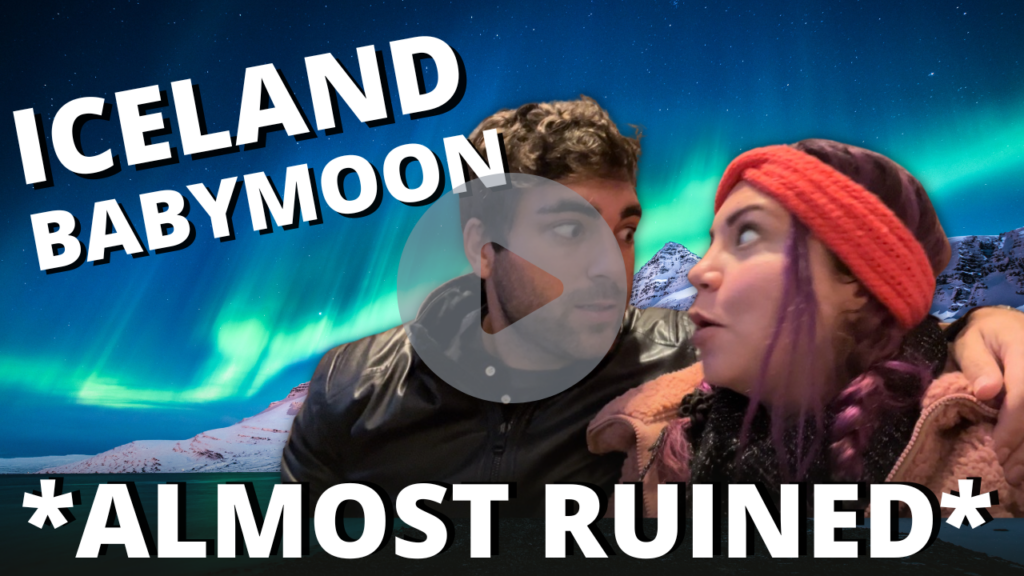In my latest Youtube video, I share with you not only the glorious first part of our babymoon trip to the magical place known as Iceland… but also how our trip was almost ruined.
Dealing with crisis – especially when it comes at the WORST time imaginable – is something I have learned to adapt slowly over time for the betterment of my mental health.
Like many of you, I’ve always dealt with emergencies reasonably well in the moment… but what really gets to me is the aftermath.
In a crisis, they say the most typical responses include fight, flight, and freeze. My go-to in an emergency is to hop into action to fix the situation, which I associate most with the “fight” response. My nervous system gets the cue that shit is hitting the fan, and my problem-solving brain kicks into high gear to ameliorate whatever the issue may be. It’s like my head clears and my body just activates.
And then….. when the dust settles and the crisis period is over, I would crash and burn. Sometimes for days, weeks, or even months after a traumatic incident.
Recovering from a heightened adrenal response is biologically a slower process than you’d expect. One doctor told me it takes 4 days for the body and mind to fully recover from an intense cortisol spike (and even longer for a prolonged stress response).
But for me, that recovery time is sometimes hard to wrap my mind and heart around.
My brain says things like, “Things are okay now! Why do I feel so anxious still?”
Or my body will just slow way down to the point where my energy levels, motivation, and creativity just flatline.
Worst of all, all the emotions that came up in the crisis – but that got pushed aside in order to take decisive action – come spilling out of nowhere, or weigh heavily like a dark cloud over me.
As a follow-up to my last blog entry on letting go of the past, this blog will explore what intentional practices I have integrated in the heat of the moment of a crisis or big problem that arises.
So if you watch my Youtube video below, I share that during our vacation, we experienced an overwhelming business crisis that shook Matt and me to the core.
(If you want to hear the circumstances of what happened, I share the whole story at time code 11:43)

Bottom line:
Shit hit the fan, and we were thousands of miles away from it.
We woke up to barages of missed calls, angry texts, and a clusterfuck of messages, and Matt and I went into full-on crisis mode.
We had to handle dishonest Airbnb guests with professionalism and poise, upset neighbors with humility and responsibility, an unreliable property manager with directness and grace, and later our overwhelmed cleaning services with gratitude and partnership.
We felt helpless, angry, resentful, violated, lied-to, disappointed, and frustrated by not only this happening – but this happening while we were trying to celebrate and relax on a very meaningful trip.
If this kind of event had occurred to us a year or two ago, it would have felt like it completely ruined our trip.
You see, we both operate well under pressure – BUT in this scenario, there were three traps for us to get easily caught in old patterns:
- Our needs around handling anger in the moment can differ and lead to disagreement.
- Our individual responses and solutions can differ and lead to disagreement.
- How we each navigate the “recovery period” after the crisis can lead to even more disagreement and frustration at each other (and, not to mention, zap all of the joy out of an otherwise once-in-a-lifetime experience).
So the first order of business for an inconvenient crisis:
EMBRACE that this is happening, rather than resent it.
How did we do that?
We cleared the plans for the day and declared it RAGE DAY.
Yes, even in beautiful Iceland on our babymoon/birthday extravaganza.
To sweep this situation under the rug and try to act like nothing is happening to us or within us would only lead to heightened anxiety and stress.
And to ruminate in this situation for longer than necessary would mean certain death to the romantic, excited energy we hoped to luxuriate in for this trip.
Next, we gave ourselves permission to feel our feelings fully
…but with two very clear boundaries:
- Feel everything you need to feel, and direct it in healthy ways that are not at each other.
- We have 24 hours to feel it all, and then for the rest of the trip we would agree to do our part (and help each other) release, move forward, and be fully in the joy of the moment.
Basically – feel fully, direct the energy consciously, and keep getting complete (link to previous blog). Rinse and repeat.
These were boundaries and conversations Matt and I haven’t always had the tools to navigate, and we are still very much in the process of learning.
When it comes to decision-making together, Matt can be very decisive and I tend to pause and consider the many options. Having these two approaches can be a huge asset to us as a team, but it can also lead to frustration with each other when we both feel strongly about something.
This tension came to a head when deciding whether or not we should fire the interim property manager who created more unnecessary problems.
Firing our main source of support during a crisis is definitely a worst-case-scenario sort of decision… since firing her meant taking additional security measures to change passwords and lock her out of accounts, on top of dealing with the issues at hand.
Once we both discerned that the logical, facts-based assessment of the situation meant that this person did not have the skills to fulfill this role and now no longer had our trust to handle this situation in our place, then the series of actions and consequences of that decision had to be handled as one team. How we worded the firing, how we protected ourselves, how we managed the situation all came down to discussing, deciding, and committing together, with no space for “I told you so’s” if things did not work out as planned.
When blame, shame, guilt, or righteousness get smeared on each other during a decision-making process (whether in a romantic partnership or a team environment), it erodes trust and unity.
We needed to prioritize staying on the same team, or the consequences of this crisis would ripple out much further into the relationship and trip.
Finally, after many hours of mitigating the situation, we found ourselves worn down and entering recovery mode.
Our energy levels were depleted, the tides of emotions were coming in small but frequent waves, and we were tasked with concluding this day in a way that allowed us to reset our focus, emotions, and energy the next day so we could enjoy our trip.
What that looked like for us was recharging separately.
We both needed some alone time (or at least quiet space to do separate things in the same room), even though a part of us felt like that wasn’t what we wanted on a special trip like this.
But by honoring our different needs, the next day when we woke up we were both able to plug into the new intention, hold space for some residual emotional ripples without them becoming big waves, and move forward.
As I said before, cortisol spikes like this can cause days of adrenal fatigue, so it was important that we released any “shoulds” we were holding about how he or I was supposed to be or feel.
Sometimes the traps we set during this recovery period can look like projecting interpretations and shoulds on each other, like wanting the other person to be more energetic or excited or just “be how we want them to be” so that we can feel better… which can bring more lonelieness and discord to the relationship.
Our commitment was to presence in the moment and joyful celebration, without judgment or obligation for it to look or be a certain way.
These practices have been hard-earned.
It has taken Matt and I both years of work to get to a place where we have healthy outlooks on moving through conflict, together and separately. And for all of the time that we have been learning and growing, we’ve had many unforseen crises that we have not handled with as much grace!
Nobody wants inconveniences like these to ruin big moments, and my hope in sharing this is that next time a surprise crisis pops up in the middle of your life (especially the times when you are TRYING TO RELAX, dammit!) you have some new tools in your conflict tool belt to help you handle whatever arises without burning yourself or those around you.
What strategies can you take from this? I’d love to support you in continuing this work. Let’s chat!


